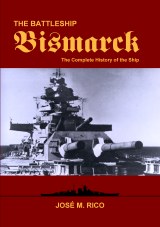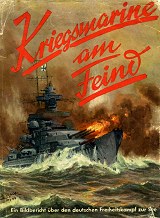 |
Home Intro Technical History Crew Models Gallery Kriegsmarine Archives
More Forum  UPDATES UPDATES |
Commander in Chief of the Kriegsmarine
Conference with the Führer on 31 July 1940, at the Berghof.
| Present: |
Chief of the OKW [Generalfeldmarschall Keitel] General Jodl Fregattenkapitän von Puttkamer Commander in Chief, Army [Generalfeldmarschall von Brauchitsch] Chief of the Army General Staff [Generaloberst Halder] |
1. Operation "Seelöwe".
The Commander in Chief, Navy, reports that all preparations are in full swing. It can be concluded from experiences gained during this period that 15 September 1940 is the earliest date which can be fixed for the operation, provided the preparations are not delayed by any unforeseen circumstances due to the weather or the enemy.
Details: Materiel has been brought up so far according to plan. Conversion of the barges will be finished by the end of August. The first trial conversion of motor coasters was unsatisfactory and a new one is in progress; these ships should be ready by the beginning of September. Subsequently the barges, etc. will be sent to the operational harbors after they have been manned. They will be ready in the harbors by the middle of September.
The situation with regard to merchant shipping is unfavorable, as a result of the heavy ice of the northern winter, losses sustained in the Norwegian operation and as a result of mines, etc. A comprehensive list has been drawn up. Requisitioning of ships will begin shortly. There will be a period of about four weeks after conversion before the ships can depart for the operational harbors. The personnel problem can be solved by the end of August if large inroads are made on the numbers of men available.
Minesweeping has commenced with exploratory sweeps but can be carried out according to plan only if we have air superiority. It will take three weeks if the weather is favorable. The fact that three minesweepers were lost off Hook of Holland shows the difficulty of this undertaking. Minelaying will begin at the end of August if we have air superiority, and will last about two weeks. The Commander In Chief, Navy, again draws attention to the effects which operation "Seelöwe" has on the German economy. (See Annex 1.) It will have a very detrimental effect on the situation in Germany in the winter of 1940 to 1941; therefore, the autumn is not a favorable time.
The Führer: What will the weather conditions be at the end of September?
The Commander in Chief, Navy: According to experiences of long standing the weather is generally bad in the North Sea and the Channel around 20 September, but good at the end of September and the first half of October; there is light fog during the middle of October and heavy fog at the end of October.
The Commander In Chief, Navy, makes the following report on matters concerning the execution of the operation:
-
a. To assure a successful debarkation as well as safe crossing of the Strait of Dover, the best time for the beginning of the landing is about two hours after high tide.
A landing at low tide has the disadvantage of rising water during the disembarkation, but the advantage that vessels which have run aground will float again.
A landing at high tide has the disadvantage that craft are grounded and immobile for about 12 hours until the next high tide, and if the next high tide does not reach the level of the previous one, it may not even float them.
Rising water is unfavorable in any case at the time of landing, since it causes transport units which are aground to float again and again, thus altering their position and delaying the disembarkation.
The first requirement therefore, is a time when the water is ebbing, about two hours after high tide.
From the point of view of the Army, the best time for the landing is during the early dawn, about 1/2 to 1 hour before sunrise. This means that the Channel crossing and the approach would have to take place for the most part In the dark.
The singular composition of the transport fleet will make it very difficult to carry this out in total darkness. i.e., with no moon. Large numbers of slow, unwieldy transport units concentrated in a small space, mixed with motor boats of the most varied types, and escorted by light units of the Navy and auxiliary vessels make it necessary to have a certain amount of light for navigational reasons, e.g., a half-moon rising at about 2300.
If these three conditions are to be taken into account, the dates can be chosen accordingly. The following days consequently will be suitable for the operation:
1. From 20 to 26 August.
2. From 19 to 26 September.
The August period is out of the question, as it will be impossible to finish preparations by then.
The early dawn is the most dangerous time for sea operations, as enemy naval forces which were far off, e.g., In Firth of Forth, during the evening may have reached the entrance to the Channel by morning without being noticed by our reconnaissance. This constitutes a great threat to the operation, should the demand made by the Army for a landing in the early dawn be granted. If the crossing is made by day, air reconnaissance can locate the position of enemy naval forces. The operation could be stopped if necessary.
Weather conditions are of the utmost importance. The Seekriegsleitung is of the opinion that the transport operation, both as regards the barges to the east as well as the steamers in the center and to the west, can be carried out only if the sea is less than 2.
The sea must be calm enough for the barges to lie almost motionless when landing, as they would immediately spring leaks by striking the ground or rooks, and this would lead to destruction of their load. In the area used for steamer transports, a heavy sea would make it impossible to transfer the heavy loads into the barges lying alongside.
Even if the first wave crosses successfully under favorable weather conditions, there is no guarantee that the same favorable weather will carry through the second and third waves, etc., as planned, owing to the long intervals between them. As a matter of fact, we must realize that no traffic worth mentioning will be able to cross for several days, until certain harbors can be utilized.
b. The Army has requested that the landing should cover a wide front, from the Strait of Dover to Lyme Bay. Transports from Le Havre and Cherbourg will proceed virtually unescorted into the immediate vicinity of the main British bases of Portsmouth and Plymouth, from which, even if British naval forces are considerably weakened by air attacks, motor torpedo boats and destroyers can come out in great numbers. The unloading of the steamers at the two western landing points will last 36 hours, during which time they will be lying off that coast. This is unjustifiable. Full operational readiness of the British Fleet must be reckoned with on this occasion. It would be irresponsible to do otherwise. The Commander in Chief, Navy, is therefore of the opinion that the crossing should be concentrated at first entirely on the Strait of Dover as far as Eastbourne, and that this route should be protected as strongly as possible by guns, mines, and the available naval forces. The demand of the Navy for the most favorable time, i.e., 2 hours after high tide by day, must also be met. It is clear that the operation will thus be rendered more difficult for the Army. The main thing, however, is to get the Army across in the first place. The Luftwaffe will also not be able to protect the landing effectively at three landing points extending over about 100 kilometers, but will have to concentrate on operating in one area.
The Commander in Chief, Navy, is of the opinion that the Army and Navy should cooperate in making careful preparations for the operation in this form, and the Strait of Dover route should be prepared accordingly. The best time for the operation, all things considered, would be May 1941.
2. The Führer inquires about reinforcements for the Navy during the winter months until May 1941. Reply: PRINZ EUGEN, BISMARCK, and TIRPITZ will be available, although training will leave a lot to be desired; possibly 8 destroyers, 6 torpedo boats, a number of S-boats, and submarines will be ready. It is doubtful whether the SEYDLITZ will be finished, since there have been delays.
3. The Führer considers other actions in the meantime. The Commander in Chief, Army, advocates supporting the Italian attack on the Suez Canal with two Panzer divisions. The Führer is planning an attack on Gibraltar.
4. The Commander in Chief, Navy, requests permission for a more extensive submarine program. More steel and other metals are needed, and in particular the manpower shortage which already hampers the present reduced submarine program must be relieved. The Führer gives his permission.
5. The Commander in Chief, Navy, emphasizes the fact that all matters having to do with operation "Seelöwe" must be given precedence over the top priority program. The Chief of the OKW promises an order to this effect.
Effects on the German Economy.
1. The effect of taking over inland shipping: The transport situation will become more critical. The efficiency of inland shipping will be decreased by about 30%.
2. The effect of taking over sea-going ships: Trade with Denmark, Norway, and the Baltic States will not be seriously affected if the requisitioning lasts only a short time. Trade with Sweden (ore and coal traffic) will be badly hampered. Trade with Italy will also suffer owing to the absence of Rhine shipping through requisitioning of Rhine tugs.
3. Results for German supplies: A 30% decrease in the efficiency of inland shipping will affect particularly the transport of bulk goods such as coal, ore and Foodstuffs.
a. Coal: Bottlenecks are Berlin and Hamburg. Supplies are irregular. Stocks hitherto built up are small, and it will be difficult to build them up afterwards.
b. Ore: Stocks in the foundries are small. There is danger that incoming ore will be piled up in the seaports where storage facilities are inadequate.
c. Foodstuffs: The fact that barges are not available will have an adverse effect on the harvest. There is danger that food will spoil owing to makeshift storage by producers and fuel shortage in the factories turning out foodstuffs. It will be extremely difficult to supply large cities adequately.
Supplies of autumn fertilizers will be made uncertain. Such a shortage would endanger the next harvest.
It will be impossible to compensate for the loss of fish resulting from the lack of trawlers. The last 100 trawlers working for the Ministry of Food will be needed as transports.
4. The loss of barges and particularly of tugs will reduce the efficiency of German transport for years.

| Home Guestbook Quiz Glossary Help us Weights & Measures Video Credits Links Contact |

